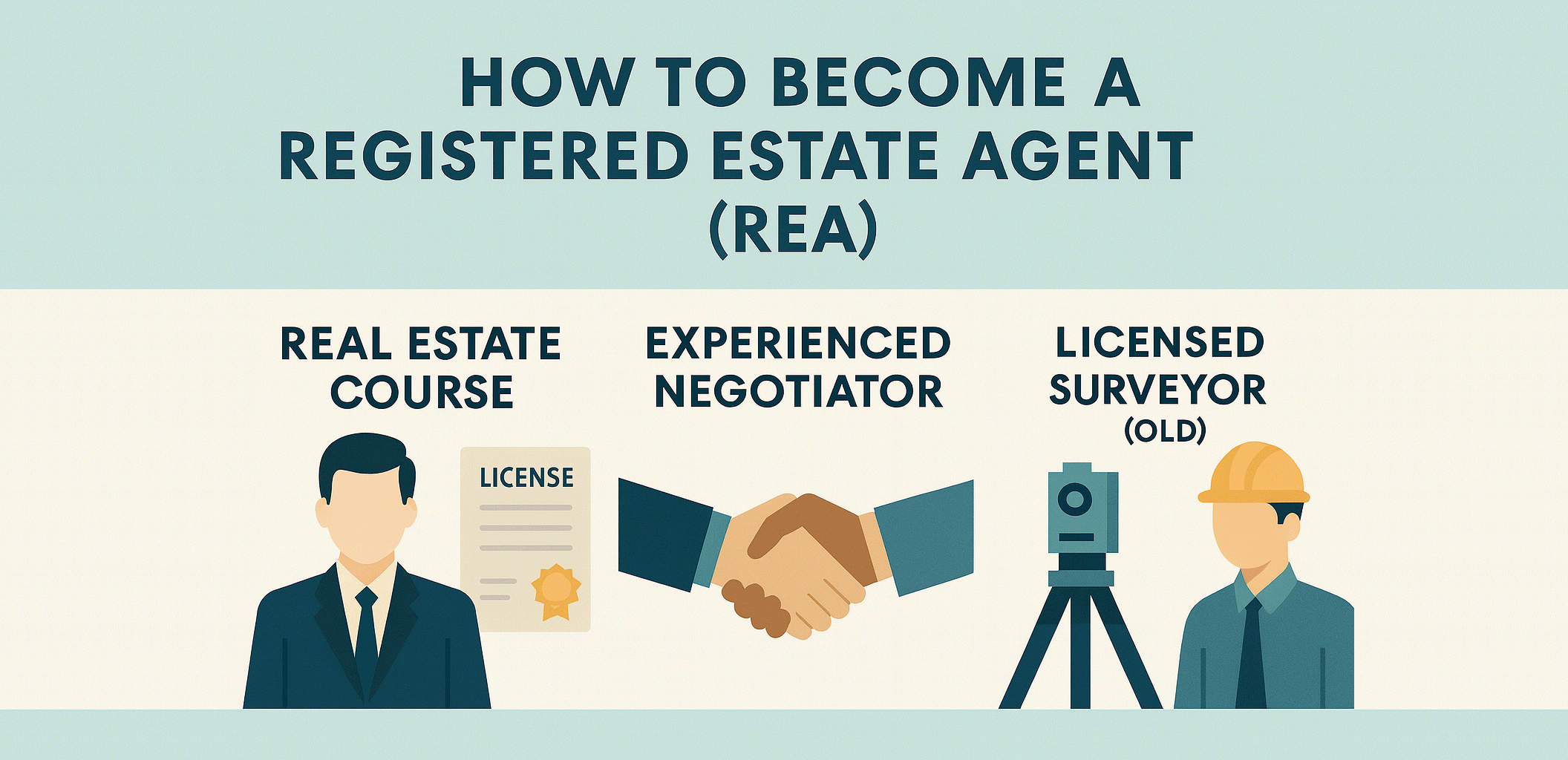How to Become a Registered Estate Agent (REA)

Becoming a Registered Estate Agent (REA) in Malaysia is a formal process governed by the Board of Valuers, Appraisers, Estate Agents and Property Managers (BOVAEP) under Act 242. There are three recognised routes to registration — though only the first two are open to new applicants today.
Route 1: The Standard Academic / Examination Path (Main Route)
This is the official pathway followed by most aspiring professionals.
Step 1 – Complete an Accredited Qualification or Pass the REA Examination
You can enter through either:
Recognised Qualification Route
Complete a Diploma or Degree in Real Estate, Property Management, or Valuation recognised by BOVAEP.
Graduates from approved programs may receive exemptions from some or all written REA exam papers.
Examination Route
If you don’t hold a recognised qualification, you must sit for Part I and Part II of the Estate Agent Examination conducted by BOVAEP.
| Course Duration | Typical Qualification | Eligible Professions |
|---|---|---|
| 2 Years | Diploma in Estate Management / Property Studies | Estate Agent |
| 4–5 Years | Degree or Master’s in Real Estate, Valuation, or Property Management | Estate Agent, Valuer, Property Manager, Consultant |
Step 2 – Register as a Probationary Estate Agent (PEA)
After passing the exams or completing your recognised course, you must apply to BOVAEP to be registered as a Probationary Estate Agent (PEA).
A PEA cannot operate independently. You must attach yourself to a licensed real estate agency supervised by a Registered Estate Agent (REA).
This REA will act as your mentor, verify your progress, and sign your logbook throughout your training period.
Step 3 – Complete Two Years of Practical Training and Maintain a Logbook
All PEAs are required to undergo a minimum of two years of supervised practical training under a licensed REA or valuation firm. During this time, you must record your daily and weekly activities — including listings, negotiations, documentation, and marketing work — in a formal logbook provided or approved by the Board. Your REA supervisor must review and sign each section of the logbook to confirm your practical experience.
Step 4 – Pass the Test of Professional Competence (TPC)
After completing your two-year logbook, you must attend and pass the TPC interview, where BOVAEP assesses your knowledge of property law, ethics, and real-world agency practice.
If you do not pass on your first attempt, you may retake the interview — there is no lifetime limit on attempts. However, because the Board only conducts a limited number of interviews each year (typically one or two sessions), failing may delay your final registration by several months.
Step 5 – Obtain the E License
Upon successfully passing the TPC, you will be issued an E License, officially recognising you as a Registered Estate Agent (REA).
As an REA, you are legally allowed to:
- Operate and own a real-estate agency
- Employ and supervise up to 50 Real Estate Negotiators (REN)
- Conduct and sign off property transactions in compliance with Act 242
Route 2: The 10-Year Experience Route (Regulation 30)
This alternative route is designed for veteran practitioners who have been active in real-estate agency work for at least 10 consecutive years, even without formal qualifications.
To qualify:
- Provide documented proof of 10 years’ continuous experience (sales records, employer verification, or client references).
- Attend a Professional Interview before BOVAEP to demonstrate competence in property law, ethics, and documentation.
Upon passing, you may be registered as a Probationary Estate Agent (PEA) and proceed to the TPC for full licensing.
This route ensures experienced negotiators and industry veterans can formalise their credentials through professional recognition.
Route 3: Legacy Conversion Route (Surveyor Path) — Closed Category
Before Act 242 (1976) came into effect, certain qualified surveyors or valuers could register directly as estate agents without sitting for the REA exams. This route recognised professionals already competent in property transactions when the professions were less separated. It is now closed to new applicants, but explains how some senior REAs originally obtained their licenses.
Summary of All Routes to Become an REA
| Route | Entry Requirement | Training / Assessment | Current Status | Outcome |
|---|---|---|---|---|
| 1. Academic / Examination Route | Recognised Diploma / Degree or REA Exam | 2 Years Logbook (under licensed REA) + TPC Interview | Active | E License (REA) |
| 2. 10-Year Experience Route (Reg. 30) | 10 Years Proven Experience | Professional Interview + TPC | Active | E License (REA) |
| 3. Legacy Conversion (Surveyor Route) | Former Surveyor / Valuer under Old Board | Direct Registration by BOVAEP | Closed to new entrants | E License (REA) |
Becoming an REA is a professional qualification equivalent to a chartered title. It typically takes 3–5 years through the academic route — or recognition through experience for long-serving practitioners. Once licensed, an REA gains legal authority, professional credibility, and the right to operate a real-estate agency anywhere in Malaysia.











































































































